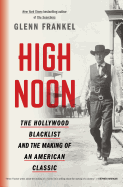
Film buffs and history aficionados will be delighted and riveted by Glenn Frankel's insightful and intimate look at the making of the classic 1952 western High Noon. Most remember the unconventional and left-leaning western as the film that won Gary Cooper a Best Actor Academy Award. Few remember that it was made at the height of the Red Scare in Hollywood, when hundreds of studio employees were blacklisted out of jobs because of their liberal politics. Carl Foreman's award-winning screenplay was an allegory about American foreign policy during the Korean War and a swipe at the House Un-American Activities Committee (HUAC) and Senator Joseph McCarthy.
Frankel (The Searchers) rightfully focuses on Foreman as the hero behind High Noon. He wrote the script after his 1947 appearance before HUAC, where he refused to name suspected Communists. Foreman was labeled an uncooperative witness and, after the release of his film, was blacklisted from films until 1961. His presence on High Noon strained relationships with its producer (Stanley Kramer) and director (Fred Zinnemann). It also made the film a target of some of the loudest right-wing hawks in Hollywood--like columnist Hedda Hopper and actor John Wayne.
Frankel's saga presents a gripping and coherent picture of the corrupt politics, paranoia and fear mongering that drove Hollywood studio heads to capitulate to anti-Communist witch-hunters. High Noon is an important and compelling history of a great film made during one of the U.S.'s worst periods. --Kevin Howell, independent reviewer and marketing consultant

